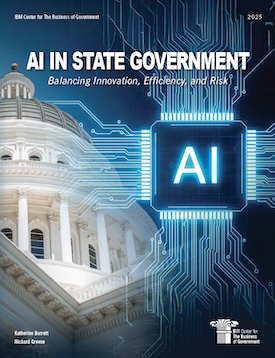
How AI Can Help States Improve Results

State governments across the country have made recent and significant progress in expanding artificial intelligence (AI) applications, specifically accelerating experimentation with generative AI (GenAI). State government exploration of GenAI points to opportunities for streamlining operations, enhancing service delivery, and supporting policy innovation—while maintaining human judgment, transparency, and accountability.
A new report from the IBM Center for The Business of Government, AI in State Government: Balancing Innovation, Efficiency, and Risk, by Katherine Barrett and Richard Greene, offers a forward-looking perspective on how GenAI can augment the work of state leaders to serve the people. AI can enhance, complement, or automate tasks within diverse state functions, from public health and transportation to education. The report emphasizes the importance of fostering cross-agency learning networks, investing in targeted workforce training, and adopting governance frameworks that balance innovation with responsible use.
Through an in-depth review of current pilot projects, emerging use cases, and early implementation lessons, the authors offer a forward-looking perspective on how GenAI can serve as a collaborative partner for state employees. The report reflects the importance of AI governance, recognizing that technology alone is not always the answer -- governance with transparency and public accountability can improve public trust. The report also addresses the risks associated with GenAI, such as hallucinations, biased data, and privacy and security concerns. The authors stress that while AI can augment workforce productivity, human judgment is necessary to address these and similar risks—like privacy issues associated with exposing sensitive data to public AI models.
Key recommendations from the report include:
- Invest in targeted workforce training: States can ensure that government employees at all levels, as well as the public, are adequately trained to understand the potential benefits and risks of AI.
- Adopt governance frameworks that drive innovation and responsible use: States can implement evidence-based policies, use guidelines, and other measures to ensure effective and safe AI development and use.
- Ensure transparency: Preserve accountability and build trust by maintaining visibility into AI projects.
We believe the report will serve as a valuable resource for state leaders seeking to harness GenAI’s potential. By following these strategies, states can cultivate a technologically empowered workforce that is resilient in an era of rapid digital change, while keeping the people at the center of public service delivery.



